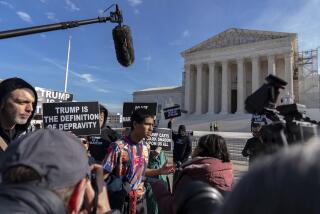âPoliticsâ Seen in Bar Panelâs Vote on Bork
WASHINGTON â Supporters of Supreme Court nominee Robert H. Bork, shaken by an influential American Bar Assn. panelâs split vote on rating the nomination, lashed out Thursday, accusing those who voted against Bork of âplaying politics.â
âNo fair-minded person, no intellectually responsible person could look at Robert Bork and find him to be unqualified to sit on the Supreme Court,â Justice Department spokesman Patrick S. Korten said. âI can only conclude that the negative votes were politically motivated, despite the fact that the ABA rules require that not be taken into consideration.â
Such strong reactions reflect a concern by Reagan Administration officials that the vote on Bork by the ABA Standing Committee on the Federal Judiciary could lend support to Borkâs adversaries and undermine a key pro-Bork argument, that the controversial appeals court judge is universally well regarded in the legal profession.
Majority Backed Bork
A majority of 10 committee members voted to find Bork âwell qualifiedâ for the high court, one member took a neutral position and four voted to find him ânot qualified.â
The vote marked the first ABA dissent on a high court nominee since three panel members voted in 1971 to rate William H. Rehnquist as âqualifiedâ to be an associate justice but ânot among the best qualified.â Moreover, it included the first outright opposition since seven members voted in 1969 to disqualify Clement F. Haynsworth Jr. because of conflict-of-interest allegations.
The split on the panel over Bork âis very significant,â said an aide to one key uncommitted Republican senator. âEveryone was always assuming that (Bork) was going to get a unanimous âwell qualifiedâ rating by the ABA and that all the (subsequent) discussion that would go on would be against that backdrop,â he said.
âMainstreamâ Arguments
The dissension means that âBork wonât be able to come in with the presumptionâ that there are no âmainstreamâ arguments against him, the Senate aide said.
Traditionally, the committeeâs votes have carried significant weight in influencing consideration of judicial nominations. Last year, for example, the Administration and Senate allies used a unanimous vote of approval by the panel as a key argument in support of Rehnquistâs nomination to be chief justice.
In Borkâs case, the Administration emphasized the positive. President Reagan was âpleased with the endorsementâ of Bork by the ABA panel, White House spokesman Marlin Fitzwater said on Air Force One en route to Miami for Reaganâs meeting with Pope John Paul II.
Other Administration officials and members of Congress, however, expressed surprise and anger at the large negative vote on Bork.
Hatch Tells Support
âFour of them are willing to play politics with this,â said Sen. Orrin G. Hatch (R-Utah), one of Borkâs chief supporters. Bork, he said, is âsuperbly qualifiedâ and âI donât see any way they can substantively criticize him on his record.â
âLetâs put this into perspective: They have given him the highest rating by an overwhelming majority,â Hatch added.
ABA President Robert MacCrate of New York denied the accusations of political motivation by the association panel. âPolitics is not a factor in the committeeâs deliberations,â he said in a statement.
The four panel members who rated Bork not qualified are Samuel Williams of Los Angeles, Joan M. Hall of Chicago, Jerome J. Shestack of Philadelphia and John D. Lane of Washington, sources familiar with the committeeâs deliberations said. Committee members refused to comment directly on what factors led the minority to oppose Bork.
Privately, however, sources suggested that several members believe Borkâs record calls his âjudicial temperamentâ into question. Judicial temperament, professional competence and integrity are the three criteria on which the panelâs rules call for judging judicial nominees.
Staff writer Ronald J. Ostrow contributed to this story.
More to Read
Sign up for Essential California
The most important California stories and recommendations in your inbox every morning.
You may occasionally receive promotional content from the Los Angeles Times.











